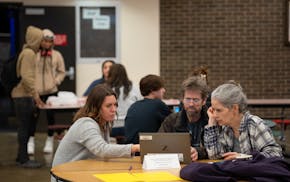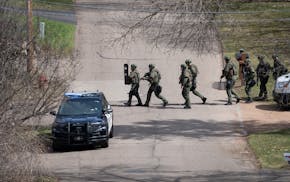James Kindle blows away lots of stereotypes about Teach for America, the national program that sends quickly trained college graduates into some of the nation's poorest classes, including Minneapolis.
TFA corps members are dilettantes in for a quick two years of do-good work before heading off to cash in on their college degrees? Kindle is nearing the end of his fifth year in Minneapolis schools. They're not serious about teaching? Kindle earned national board certification, something few teachers attain. They're undermining unionized teachers? Kindle is a steward at his school.
"James is the most skilled teacher I've ever observed," said Kaitlin Lindsey, a traditionally trained teacher who was hired the same year as Kindle, for the same job of helping students to learn English, at the same school, Sullivan.
Yet Minneapolis, the only school district in Minnesota employing teachers from the much-debated program, has cut back sharply this school year in its use of TFA-trained teachers. It hired only three additional TFA trainees to start teaching last fall, and has a total 14 corps members on its payroll, down from 20 a year earlier. There are also nine alums like Kindle teaching for the district. He is the only survivor from the inaugural TFA class in Minneapolis still teaching in the district.
The rap against TFA is that its teachers enter high-poverty classrooms with too little training, don't stick around and undercut the employment chances of better trained teacher college graduates. Backers say the program offers schools a supply of bright, motivated new college graduates who carry idealism into some of the toughest classrooms, and often stay in education, whether or not they teach.
Minneapolis has hired TFA teachers every year since the program entered Minnesota in 2009, but it's gotten choosier. It hired a dozen as recently as the 2012-13 school year. That year it sent six TFA rookies to Bethune, one of the district's toughest assignments, because more experienced district teachers weren't willing to fill openings there, according to Mark Bonine, who oversaw Bethune then and is now the Brooklyn Center superintendent. Some argue that the hullabaloo over TFA primarily in Minneapolis schools far exceeds its actual impact. Fewer than 1 percent of Minneapolis teachers arrived via TFA. The debate over TFA was fanned last year when Gov. Mark Dayton vetoed an appropriation to expand TFA's presence in the state, and a state board he appointed denied TFA a blanket waiver from teacher licensing rules for all its recruits. Both moves were seen as friendly to Education Minnesota, the statewide teacher union. The teaching board now is poised to approve an alternative licensing proposal by TFA and the University of Minnesota that was opposed by some U education students and staff.
Tale of two teachers
Kindle and Lindsey began teaching the same year, both entering classes or pulling students out to work with English learners. That gave them an opportunity to compare what they learned in traditional and nontraditional approaches.
Kindle, for example, came in better at classroom management, how to structure a lesson and engage students, Lindsey said. But Lindsey was better grounded in the pedagogy of teaching English learners and more experienced from student teaching, Kindle said. So they learned from each other, from colleagues at Sullivan and from mentors. "We were both struggling in different ways," he said.
Lindsey, a Champlin Park High School grad, finished her master's in education at the U in 15 months; Wyoming native Kindle set out to be a journalist but once accepted by TFA, he got a reading list in such topics as instructional practices, cultural aspects of education and institutional racism.
TFA sent him to Los Angeles for summer training, split between teaching summer school Spanish to high school students and getting intensive TFA instruction in topics such as lesson planning and data analysis. After that, TFA sent him to Minneapolis for a totally different assignment: working with mostly Somali-American elementary students who were learning English. Nevertheless, he found key skills carried over, such as getting to know the families of students. Meanwhile, he studied toward a degree and a teaching license at Hamline University, attaining that in 18 months.
"I didn't feel as prepared as I'd like to be," he said, but that's something he likely shared with traditionally trained rookie teachers. "I was extremely privileged to have really good colleagues early on."
Tensions over TFA
Yet there was also some tension over his TFA status, although he chose not to advertise it. "I think there were some teachers who, when it came up, got quiet and maybe bit their tongues a little bit," he said. "I hope by and large they see me as competent." Lindsey said she was initially surprised that Sullivan hired a TFA teacher, knowing that students who graduated with her were still looking for jobs. But she said that the organization recruits quality teachers.
Kindle believes that aspects of TFA can be improved. Nationally, TFA counts 62 percent of its corps members who complete their two-year stint remaining in education, but only about half of them are teaching. "I believe there is too much turnover of TFA," Kindle said. "But there is too much turnover of regular teachers at high-poverty schools."
TFA announced steps earlier this year to address both preparation and retention of its trainees. First, it is identifying 2,000 college juniors who want to be TFA teachers in 2015. That gives it an extra year to prepare them in the nuts and bolts of teaching. Second, some of its regions will offer extended support for TFA corps members who choose to keeping teaching after their two-year commitment. Those changes react to feedback from TFA's participants. "The dominant thing you hear is, 'It was so hard and I didn't feel really prepared,' " said Matt Kramer, TFA's national co-CEO.
The group plans to place 41 recruits in the region, and at least one will go to Brooklyn Center schools, where Bonine supports TFA. The additions will keep its Twin Cities corps at 78.The number of TFA teachers for next year in the Minneapolis district hasn't been decided. Kindle hopes the decision will not be clouded by criticism."I think the district should hire the best teacher for the kids, regardless of where they come from," he said.
Steve Brandt • 612-673-4438
Twitter: @brandtstrib

FAFSA completions in Minnesota drop amid flawed efforts to update college financial aid form

Man killed in Minnetonka by law enforcement started gun battle with deputies, BCA says

Should Hennepin County consider the race and gender of contractors it hires?
Search resumes in southwestern Minnesota for 15-year-old boy who jumped in lake after losing canoe paddle

